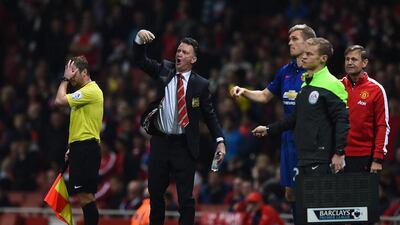It says at least as much about English football culture, as it does about Manchester United this season, that so much has been said so disparagingly about Louis van Gaal’s changes of formation.
He began with a back three, switched to a midfield diamond, then went to an asymmetric 4-3-3 before reverting, against Arsenal, to a back three and then something close to a diamond again in the 3-0 win over Hull City on Saturday.
Perhaps it is true, as the critics have said, that Van Gaal does not know his best formation, that he is still working out the best way to set his side up.
Read more: Louis van Gaal dreading busy December for Manchester United
But it should also be noted that he has had an almost unprecedented run of injuries – when Angel Di Maria limped off with a hamstring problem on Saturday it was the 41st injury to a United player in Van Gaal’s four months in charge.
When United host Stoke City on Tuesday night, they will be without Di Maria, James Wilson, Luke Shaw, Daley Blind, Rafael, Phil Jones and Jesse Lingaard, while Jonny Evans is unlikely to be available and Wayne Rooney is a slight doubt.
Van Gaal’s first move away from three at the back was prompted by the fact that, thanks to some irrational summer spending that left the squad hopelessly unbalanced and the injuries, he no longer had three centre-backs.
In that sense, his flexibility has been in part enforced as he adapts to circumstance during his early months at Old Trafford.
In any case, there is surely a positive in being flexible.
The decision to go with a back three against Arsenal, for instance, was a surprise, but tactically it worked.
The third central defender that was used offered an extra layer of protection as Arsenal were drawn forward, which opened them up to the counter-attacks that – as Sir Alex Ferguson made clear – have been the way to beat them for the past decade.
The first United goal in that win at the Emirates Stadium last month was freakish but it resulted from a cross from one wing-back falling to the other wing-back.
If United had not had a back three, there would never have been two players in wide areas coming from so deep.
The second goal came from Di Maria’s pace on the break as he was used in that strange hybrid role – almost as a central winger – that Arjen Robben exploited to such effect during the Fifa World Cup in the summer for the Netherlands.
Essentially, a back three provides a platform for experimentation with less orthodox patterns at the front.
That is not something that is especially revolutionary but it is unusual in English football.
Against Hull the back four returned with Michael Carrick sitting deep just in front of it.
United controlled possession and the game, and at times had seven men in attacking areas.
A different opponent called for a different approach and the result was a third successive league win.
At least as significantly, they have conceded just three times in their past five games, despite facing in that spell three of last season’s top four.
As the “philosophy” that Van Gaal speaks of so often takes hold, his team is looking more and more solid.
There may even come soon a point at which all four of Robin van Persie, Radamel Falcao, Rooney and Di Maria are fit and Van Gaal has to work out a way of either fitting all of them into his side or leaving one of them out.
Given the way Van Persie responded to his manager’s hints about his lack of form before Saturday’s game, a little competition may not be a bad thing.
Van Gaal may have been fortunate that some of the pressure that would have been on him has been relieved by the fact that so many of United’s rivals have also had poor starts.
David Moyes’s United last season also had 22 points from 13 games, but lay eighth, while Van Gaal’s men sit fourth, but the signs are that the world is beginning to conform to Van Gaal’s will.
English Premier League fixtures
Tuesday (in UAE time)
Burnley v Newcastle United, 11.45pm
Leicester City v Liverpool, 11.45pm
Manchester United v Stoke City, 11.45pm
Swansea City v Queens Park Rangers, 11.45pm
West Bromwich Albion v West Ham United, midnight
Crystal Palace v Aston Villa, midnight
Wednesday
Arsenal v Southampton, 11.45pm
Chelsea v Tottenham Hotspur, 11.45pm
Everton v Hull City, 11.45pm
Sunderland v Manchester City, 11.45pm
sports@thenational.ae
Follow our sports coverage on twitter at @SprtNationalUAE

